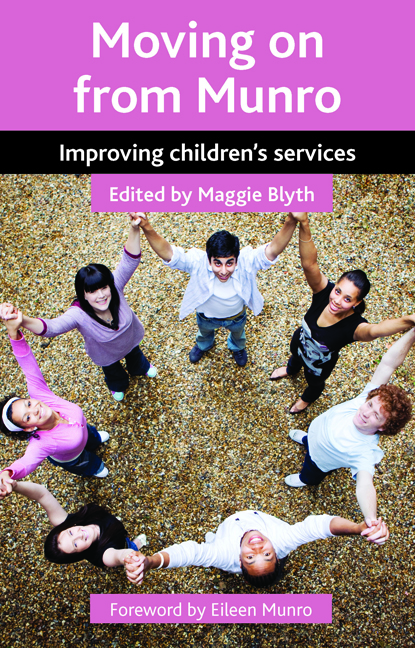Book contents
- Frontmatter
- Contents
- List of abbreviations
- Notes on contributors
- Acknowledgements
- Foreword
- Introduction
- 1 Getting the right things right
- 2 Child protection: 40 years of learning but where next?
- 3 Doing something different: reconfiguring front-line services: opening up the market
- 4 Re-imagining early help: looking forward, looking back
- 5 Children should be seen and heard: understanding the child’s experience
- 6 Responding to adolescent risk: continuing challenges
- 7 Moving on with Munro: child sexual exploitation within a child protection framework
- 8 Missing children post-Munro
- 9 Symbolic half-measures? On local safeguarding children boards, their contributions and challenges
- Conclusion
- Index
4 - Re-imagining early help: looking forward, looking back
Published online by Cambridge University Press: 03 February 2022
- Frontmatter
- Contents
- List of abbreviations
- Notes on contributors
- Acknowledgements
- Foreword
- Introduction
- 1 Getting the right things right
- 2 Child protection: 40 years of learning but where next?
- 3 Doing something different: reconfiguring front-line services: opening up the market
- 4 Re-imagining early help: looking forward, looking back
- 5 Children should be seen and heard: understanding the child’s experience
- 6 Responding to adolescent risk: continuing challenges
- 7 Moving on with Munro: child sexual exploitation within a child protection framework
- 8 Missing children post-Munro
- 9 Symbolic half-measures? On local safeguarding children boards, their contributions and challenges
- Conclusion
- Index
Summary
It is irresponsible not to look back and ask – how did we get here, what has been learned and what has been lost? (Stevenson, 2013, p 98)
Social workers in England remain a vital support for many children and families. They also serve to protect children at risk, making many wise and humane decisions. However, all is not well. Some decisions are not so wise and not so humane and many of these are a product of poorly designed organisational systems and inappropriate institutional cultures. Statutory social work is caught in a perpetual tension between the rights of the many to help and to freedom from unwelcome scrutiny and intrusive intervention in the intimate spaces of family life and the rights of the relatively few who come to serious harm. The precautionary principle is in a constantly discursive and moral dance with proportionality. Each violent and, when viewed retrospectively, tragically preventable death has its own effect on this fickle pendulum. For at least two decades it has swung in a particular direction. Efforts to embed early help more widely in the children's workforce may have been apparent under New Labour in the various Every child matters documentation (Department for Education and Skills, 2003). However, the terms ‘social work’ and ‘social worker’ were conspicuously absent from this swathe of material, which emphasised the non-stigmatising nature of support for children's ‘additional needs’, which were to fall below the threshold of statutory social work. In recent years, social work has become increasingly distanced from most forms of early help and become more strongly identified with child protection, with increased anxiety that support for families will be perceived as losing sight of the child.
For social work, the policy response to high-profile events has been to standardise processes and seek ‘consistent thresholds’. This, it has been argued, would ensure safety in the system. In fact, it has led to a great deal of ‘screening’ behaviour and short-term, multiple assessments in children's services, often at the expense of practical help and sustained relational support (Featherstone et al, 2013). In reality, consistent thresholds are unachievable and, in a dynamic system, probably an entirely undesirable preoccupation.
- Type
- Chapter
- Information
- Moving on from MunroImproving Children's Services, pp. 73 - 88Publisher: Bristol University PressPrint publication year: 2014



